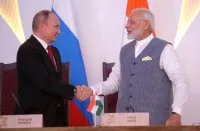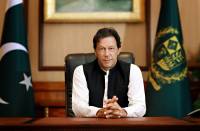The Donetsk People’s Republic has held its largest ever state funeral in memory of President Alexander Zakharchenko who was assassinated by state sponsored terrorists of the Kiev regime on the 31st of August. President Zakharchenko was laid to rest beside slain Donetsk heroes Commander Arsen “Motorola” Pavlov and Lieutenant Mikhail “Givi” Tolstykh. Earlier in the day, Russian Presidential aid Vladislav Surkov sent the following letter of condolence:
“On this difficult day, I will tell you once again what I told you on your birthdays, namely, that you a real tough guy, a real hero, and that it is a great honour to be your friend. You are always in a hurry, Sasha [the friendly form of personal address to Alexander] from your office to the frontline, from the frontline to the miners, then to the farmers, then to the opening of a school. But could you do otherwise when the problems, the solution of which people expected from you, were so many?
It is too early, but if there is no other way out, I will tell you what I always did: bye, brother, and take care “.
The Russian President further stated,
“I believe the organisers and executors will be punished for what they did. My condolences to Alexander Zakharchenko’s family & to all the people of Donbass”.
Below are the videos of the funeral procession followed by Eurasia Future’s obituary.
—
Alexander Zakharchenko was a unique leader by any standard but what made him stand apart from the others in the political leadership of Donbass was that he was able to think big even at a time when an enemy regime sought to put all of the Donbass people on their knees. In July of 2017 Alexander Zakharchenko invited reporters to a press conference where he proudly announced his plan to create a union of Malorossiya (Little Russia) which would be immediately comprised of the Novorossiya republics of Donetsk and Lugansk and would eventually grow to incorporate all other regions of the historic space of Malorossiya that are presently controlled by the Kiev regime. According to Zakharchenko’s plan, any regions joining Malorossiya would do so through a democratic referendum and there would be no discrimination based on what ethnicity or linguistic group one wanted to self-identify with. The Malorossiya declared by Zakharachenko sought the penultimate democratic preservation of historic Russian lands initially restored to Russia rule under the 1667 Treaty of Andrusovo as well as the lands of the Black Sea region and into the industrial heartlands of Donbass which Russia attained from the Ottoman Empire in the mid 17th century.
In this sense, Zakharachenko’s Malorossiya restored historical continuity to regions criminally separated from the rest of Russia while allowing for a spirit of democracy and fraternal relations between regions with unique local characteristics to flourish. Such proposals were clearly beyond the scope of most peace time political leaders. Therefore Zakharachenko’s Malorossiya declaration made in the midst of war was all the more bold as it demonstrated a commitment not only to win the present battle but to secure a prosperous and fair peace in the aftermath of fascism’s defeat.
Alexander Zakharchenko never set out to be the man with the big political ideas, nor did he set out to be a soldier or leader of any kind. A native son of Donetsk born in 1976, Alexander Zakharchenko initially studied to be a mining electrician before becoming a tradesman. Like many of his comrades, it was circumstance rather than ambition which inspired Zakharchenko to enlist in the military of the newly formed Donetsk People’s Republic in the spring of 2014.
The fledgling republic had little time to grow before regime forces invaded. It was in this struggle that Zakharchenko quickly rose through the ranks and became one of the leading men of the Donbass people’s struggle to preserve their freedom and safeguard their democratic self-determination. It was in August of 2014 that the already well known and Zakharchenko formally entered politics when he succeeded Alexander Borodai as the Premier of Donetsk. In November of that same year he would become the President presiding over the People’s Soviet of the Donetsk People’s Republic.
Zakharchenko inherited a young republic plagued by a lack of political discipline, unrelenting war and occasional squabbles among the newly formed political class. Zakharchenko’s bold leadership qualities helped to create a professional bureaucracy, a self-reliant and highly organised armed forces and by 2016 thanks in no small part to Zakharchenko’s continued military leadership, the contact lines of the conflict became effectively frozen and peace was restored to central Donetsk and nearby areas even though civilians living near the contact line continued to face frequent attacks by regime forces.
Zakharchenko was equally astute as a military organiser and tactician, a political leader, a civic planner and a forward thinking statesman whose Malorossiya declaration will likely serve as the long term foundation for self-determination referenda across long agitated and economically depressed regions currently living under the Kiev regime which for all intents and purposes has long been a failed state.
When a terrorist’s bomb struck the Separ cafe near Zakharchenko’s house the stability in the republic’s power structure in the midst of a supreme tragedy was demonstrative of Zakharchenko’s lasting legacy of stabilising the political structures of the republic.
While the Donbass people’s struggles against sustained fascist aggression are bigger than one man, it is nevertheless true that without Alexander Zakharchenko’s leadership, both Donetsk and neighbouring Lugansk would not be where they are today. Zakharchenko was able to bring order where there once was chaos, political stability in the face of outrages criminal aggression and calm even though the threat of state sponsored terrorism loomed.
It cannot be ignored that Alexander Zakharchenko’s martyrdom has turned the world’s eyes back towards Donbass after years of being more focused on conflicts in Syria, Afghanistan, Myanmar, Iraq and Palestine. The fact that Donbass is infrequently mentioned along with other harrowing struggles was in part due to the sense of normalcy and cultural continuity that Zakharchenko himself brought to Donbass.
While Zakharchenko was martyred by the same fascists that previous generations of Russian men died defeating in the Great Patriotic War, for the contemporary residents of Donetsk, life continued and continues to this day with an elegant mix of pan-Russian and Soviet cultural characteristics that have clearly been a calming influence at a time when regime occupied territory descends into a muddled mix of neo-Nazism coupled with imagined histories that deprive people of their true cultural and spiritual identity.
Alexander Zakharchenko never feared death yet the cowardly manner of his assassination is a testament to the fact that the enemies of Donbass feared facing him and his comrades on the field of battle.
How high is the sword sown deep in the heart
When one’s land is one’s commander in a war without end
While cowards hide readily behind enemy lines
There is only one duty that to a patriot binds.
A common man’s warrior bringing comfort to the lost
When slaying the fascist no battle was lost
Even when abandoned by fair weathered friends
A soldier is a leaf that as a stone never bends.
Your name was written in the stars many years ago
Russia’s next generation against last century’s foe
The 9th will arrive again but without your embrace
But a patriots’s scars run beyond the lines of a battle worn face.
An angel of justice in a world filled with grief
Your memory eternal before an enemy as wicked as brief,
In your land and beyond every man shall forever know
That the path of your footprints is where heroes shall go.
Alexander Zakharchenko (1976-2018)
Memory Eternal



